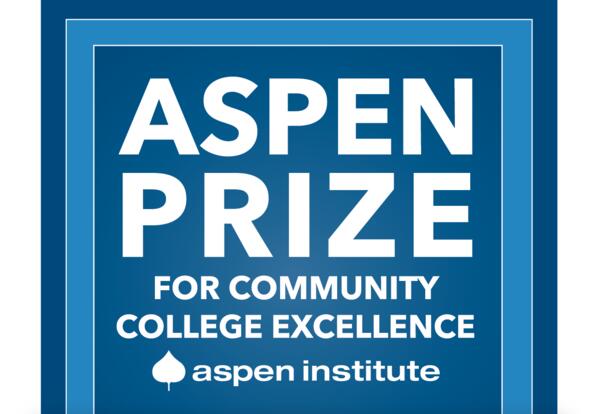
WASHINGTON, D.C., November 2, 2021 — Today, the Aspen Institute named South Louisiana Community College one of the 150 institutions eligible to compete for the $1 million Aspen Prize for Community College Excellence, the nation's signature recognition of high achievement and performance among America's community colleges. This is the second year in a row SLCC has been named a Top 150 Community College.
The colleges selected for this honor stand out among more than 1,000 community colleges nationwide as having high and improving levels of student success as well as equitable outcomes for Black and Hispanic students and those from lower-income backgrounds.
The 150 eligible colleges have been invited to submit data and narratives as the next steps in an intensive data and practice review process, culminating in the announcement of the Prize winner in spring 2023.
“I am immensely proud of the mission-driven work by our faculty and staff, as well as the incredible support and collaboration from our partners and stakeholders,” said Dr. Vincent June, SLCC Chancellor. “I extend my thanks for helping the college reach this milestone and for continuing to work together to change lives and elevate our communities within Acadiana.”
The Aspen Prize spotlights exemplary community colleges in order to elevate the sector, drive attention to colleges doing the best work, and discover and share highly effective student success and equity strategies. Since 2010, Aspen has chosen to focus intensively on community colleges because they are—as First Lady Dr. Jill Biden stated at the 2021 Aspen Prize ceremony — “a powerful engine of prosperity.”
But student outcomes vary enormously among community colleges, and improving those outcomes is essential to securing our nation’s economic future, strengthening communities, and ensuring that diverse populations experience economic mobility and prosperity. With these goals in mind, the Aspen Prize honors colleges with outstanding achievement in five critical areas: teaching and learning, certificate and degree completion, transfer and bachelor’s attainment, workforce success, and equity for students of color and students from low-income backgrounds.
“In an era of persistent inequity and workforce talent gaps, our nation’s best community colleges are stepping up to deliver more degrees to increasingly diverse students so they are prepared for the good jobs waiting to be filled,” said Josh Wyner, executive director of the Aspen Institute College Excellence Program. “Leaders of exceptional community colleges understand that achieving excellence requires expanding college access and increasing degree completion, but it doesn’t stop there. They are committed to ensuring that all students—including students of color and those from low-income backgrounds—graduate with the skills needed to secure a job with family-sustaining wages or successfully transfer to and graduate from a university. That same commitment that stands at the center of the Aspen Prize: to advance the goals of social mobility and equitable talent development.”
The eligible colleges represent the diversity and depth of the community college sector. Located in urban, rural, and suburban areas across 34 states, these colleges serve as few as 230 students and as many as 57,000. Winning colleges have ranged from smaller institutions serving rural community and smaller towns—including Lake Area Technical Institute (SD, 2017 Prize winner) and Walla Walla Community College (WA, 2013)—to large community colleges serving major metropolitan areas, including Miami Dade College (FL, 2019) and San Antonio College (TX, 2021).
The four other previous winners are Indian River State College (FL, 2019); Santa Fe College (FL, 2015); Santa Barbara City College (CA, 2013); and Valencia College (FL, 2011).
In this first round, eligibility for the Aspen Prize is based on publicly available data. Eligible colleges must show strong and improving student outcomes in key areas such as retention, completion, transfer, and equity. Nationwide, 15 percent of community colleges (150 of the approximately 1,000 public two-year colleges nationwide assessed for the Prize) have been invited to apply—the full list can be accessed on the Prize homepage.
The next steps in the process include:
● Selection of the top ten finalists by an expert panel of 15 experts in community colleges, higher education, and workforce training, to be announced in spring/summer 2022
● Fall 2022 site visits to each of the ten finalists, during which the Aspen Institute and partners will collect additional information, including employment and earnings data and insights about promising practices
● A distinguished jury will meet and make award decisions in the first quarter of early 2023
● Announcement of the Aspen Prize in late spring 2023
For a full list of the top 150 eligible institutions and to read more on the selection process, visit www.highered.aspeninstitute.org/aspen-prize.
# # #
The Aspen Prize is generously funded by Ascendium and the Joyce Foundation.
The Aspen Institute College Excellence Program aims to advance higher education practices, policies, and leadership that significantly improve student outcomes, especially for the growing population of low-income students and students of color on American campuses. For more information, visit www.highered.aspeninstitute.org and www.linkedin.com/showcase/aspenhighered, and follow @AspenHigherEd on Twitter. The Aspen Prize hashtag is #AspenPrize.
The Aspen Institute is a community-serving organization with global reach whose vision is a free, just, and equitable society. For 70 years, the Institute has driven change through dialogue, leadership, and action to help solve the world’s greatest challenges. Headquartered in Washington, D.C., the Institute has offices in Aspen, Colorado, and New York City, and an international network of partners. For more information, visit www.aspeninstitute.org.
